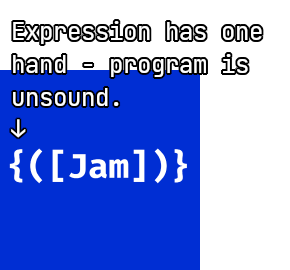willmcpherson2.com/two-hand-demo
- cabal
- ghc
https://www.haskell.org/downloads/
$ cabal run two-hand -- examples/langjam.th
error at 0:0
Expression has one hand - program is unsound.
All expressions should have two hands, e.g. (f x)
↓
{([Jam])}In Two Hand, all expressions have two hands.
Let's define something:
{main [x x]}
The left hand of a definition is a name and the right hand is an expression.
Here the expression is a function [x x]. The left hand is a
parameter and the right hand is an expression. This function just
takes something and returns it.
The interpreter will print [x x]. This is because a function
evaluates to itself.
Let's extract that function:
{id [x x]}
{main (id id)}
To call our new id function, we use application (id id). Both
hands of an application are expressions.
The interpreter prints [x x].
And that's all.
But what about multiple arguments?
{const [x [y x]]}
{main ((const [a a]) [b b])}
Result: [a a]
But how do I write Hello World?
{main [hello [world [! !]]]}
Result: [hello [world [! !]]]
But what about
if?
{true [x [y x]]}
{false [x [y y]]}
{not [x ((x false) true)]}
{if [bool [a [b ((bool a) b)]]]}
{main (((if (not true)) [a a]) [b b])}
Result: [b b]
But what about data structures?
{nil [_ [x x]]}
{cons [x [xs
[f [_ ((f x) xs)]]]]}
{map [f [xs
((xs
[x [xs ((cons (f x)) ((map f) xs))]])
nil)]]}
{last [xs
((xs
[x [xs
((xs
[_ [_ (last xs)]])
x)]])
nil)]}
{true [x [y x]]}
{false [x [y y]]}
{not [x ((x false) true)]}
{trues ((cons true) ((cons true) nil))}
{main (last ((map not) trues))}
Result: [x [y y]]
But what about numbers?
{0 [f [x x]]}
{1+ [n
[f [x (f n)]]]}
{+ [x [y
((x
[n (1+ ((+ n) y))])
y)]]}
{true [x [y x]]}
{false [x [y y]]}
{> [x [y
((x
[n
((y
[m ((> n) m)])
true)])
false)]]}
{1 (1+ 0)}
{2 ((+ 1) 1)}
{main ((> 2) 1)}
Result: [x [y x]]
